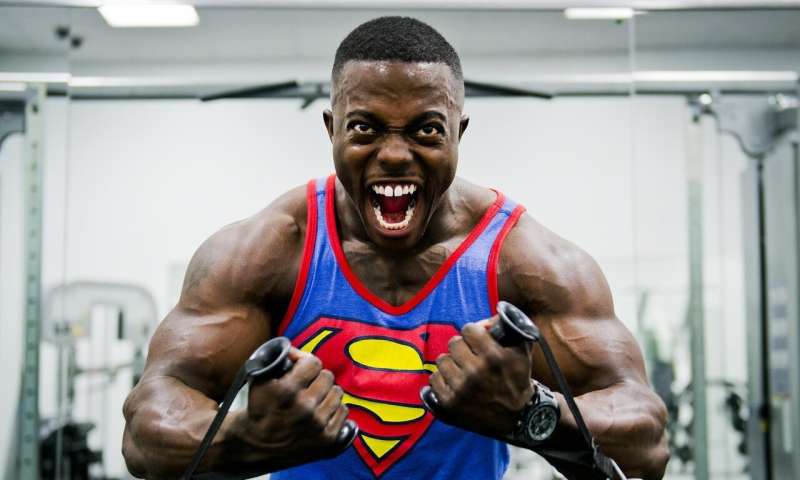Forward-thinking gym lifts weights, shifts attitudes

A gym in Boston, Massachusetts, with an inventive vocational path that prepares students to work as personal trainers serves as a telling example for how community-based programs can develop anti-racism practices within organizations that contribute to the cultivation of racial unity, according to a paper published by a University at Buffalo Social Work researcher.
“Efforts like this can help break down segregation and begin moving society out of its current racial divide,” says the paper’s author, Christopher St. Vil, Ph.D., an associate professor in the UB School of Social Work.
“These programs work.”
Intergroup contact theory is at the center of St. Vil’s study. This theory suggests that contact between different racial and class groups is an effective means of reducing bias and prejudice. Hundreds of papers have been published that support this idea, but that research has been conducted mostly through laboratory studies. St. Vil took the theory into the real world. He explored it qualitatively by speaking with the participants of the Boston program in order to expand our understanding for how intergroup contact works in society.
“This study is one example of the effectiveness of programs that utilize intergroup contact to break down racial barriers, but the research also shows how Black and Brown men can serve in these programs that advance anti-racism practices that further diversity and inclusion,” St. Vil says.
His findings appear in the Journal of Community Practice.
Much of St. Vil’s research represents a wide-angle look at cross-age peer mentoring, where older adolescents mentor their younger peers. Unlike traditional mentoring, where the mentee realizes most of the relationship’s benefits, cross-age peer mentoring provides reciprocal benefits, with the mentor realizing the same gains as the mentee, such as elevated self-esteem and improved connections in school and at home.
Mentoring participants for this research often relied on identifying ideal students, but St. Vil’s work suggests similar results when mentors are selected from underserved populations.
That’s why he went to Boston after hearing about Inner-City Weightlifting (ICW).
ICW is a non-profit established in Boston in 2010. Its goal is curbing gun violence by extending opportunities to individuals who have engaged in gun violence or have been incarcerated. The gym’s mission is twofold, and merges physical fitness with social justice.
“While the track to becoming a personal trainer fulfills the fitness passion, the second passion of social justice is grounded in improving the plight of Black and Brown men from marginalized communities and eradicating racism, stigmatization and prejudice through anti-racism work,” says St. Vil.
ICW’s location is not public because of the need to navigate social situations that could lead to recidivism. It’s a safe place, a place to work out, but it also teaches, prepares and pays for students interested in pursuing careers as credentialed personal trainers.
St. Vil recruited 19 participants for the study: 10 trainers who completed ICW’s preparation, all of whom were Black and Latinx, ranging in age from 21 to 33, who would train clients at a gym in Cambridge. All nine clients for the study were white, between the ages of 29 and 80 and had college degrees, including seven with advanced or terminal degrees.
The idea was to learn whether the benefits of reciprocal mentoring would surface in this context, where people of different races and classes work in a provider-client relationship, by providing meaningful engagement.
“Overall, the findings suggest that the intergroup contact facilitated by ICW resulted in a shift in worldview and attitudes of the clients,” says St. Vil. “Further, the shift in attitudes of the trainers included shifts in views around race and class as well as behavior changes that included desistance of crime.”
St. Vil says additional research could explore whether the themes that emerged from his ICW study are as effective in other areas where there exist opportunities for bringing people of different races and classes together.
“This current racial moment in society exists because this country has spent trillions of dollars in segregationist policies and practices that keep people apart,” says St. Vil. “Programs like ICW’s can combat that investment. That’s what it does. And that’s what we need.
“ICW provides one example of an initiative bursting the bubble of racism that currently grips our society.”
Dismantling anti-Black racism in our schools: Accountability measures are key
Christopher St. Vil et al, Bursting bubbles: outcomes of an intergroup contact intervention within the context of a community based violence intervention program, Journal of Community Practice (2021). DOI: 10.1080/10705422.2021.1997851
Citation:
Forward-thinking gym lifts weights, shifts attitudes (2022, January 25)
retrieved 25 January 2022
from https://phys.org/news/2022-01-forward-thinking-gym-weights-shifts-attitudes.html
This document is subject to copyright. Apart from any fair dealing for the purpose of private study or research, no
part may be reproduced without the written permission. The content is provided for information purposes only.
For all the latest Science News Click Here
For the latest news and updates, follow us on Google News.

